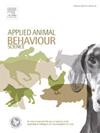测量空间记忆、外周炎症和消极情绪状态可预测健康老龄猫的社交认知能力
IF 2
2区 农林科学
Q1 AGRICULTURE, DAIRY & ANIMAL SCIENCE
引用次数: 0
摘要
衰老是一个复杂的多维过程。正常衰老通常伴随着多个认知领域的衰退,包括记忆和社会认知。随着衰老的进展,往往被忽视的认知能力衰退的早期表现会提前出现,导致无法适应新的情况和环境。影响认知能力衰退的潜在机制仍然难以捉摸,但除其他机制外,炎症反应、与年龄相关的促炎症介质慢性生成的增加以及情绪压力都与此有关。对猫的认知功能研究不足,目前还没有研究表明潜在的风险因素与衰老对象的认知症状之间存在联系。了解这种联系至关重要,因为这有助于及早发现认知功能衰退,并鼓励采取个性化的预防性干预措施。我们开展了一项公民科学研究,首次调查了 44 只健康的私人饲养的宠物猫(7-14 岁)的认知功能、压力和炎症标志物白细胞介素 (IL)-1β 和 IL-10之间的关系。测试中使用了一项测试空间记忆的任务,要求猫回忆食物诱饵容器的位置。此外,还采用了一项无法解决的任务来评估猫的社会认知能力和认知灵活性,方法是测量猫如何使用参照物交流(即在仪器和看护人之间交替注视),以及猫在试图获取无法触及的食物时的坚持程度。在对人口统计学因素和压力行为进行调整后,进行的广义线性回归分析表明1)在无法解决的任务中,空间记忆与使用与照顾者的社会参照(更多的目光交替)之间存在预测性的正相关关系,这突出了认知领域之间的相互作用在维持复杂行为中的重要性;2)在无法解决的任务中,如果猫的血清中 IL-1β 水平较高,则猫对照顾者的社会参照(较少的目光交替)的参与度会降低,尤其是随着猫年龄的增长。猫的社会认知能力也会受到压力相关行为的负面影响,这并不奇怪,因为猫是有知觉的动物,其日常行为也会受到情绪状态的影响。这些发现为研究衰老过程中不同认知领域之间的相互影响以及情绪和炎症对健康衰老猫认知变化的潜在影响提供了新的视角。利用这种多维方法开展的进一步研究将有助于探索这些认知老化机制以及早期检测老年猫认知变化的潜在标记物,这对于及时干预至关重要。本文章由计算机程序翻译,如有差异,请以英文原文为准。
Measures of spatial memory, peripheral inflammation and negative emotional state predict social-cognitive skills in healthy aging cats
Aging is a complex, multidimensional process. Normative aging is typically accompanied by declines in several cognitive domains, including memory and social cognition. As aging progresses, the often-overlooked early manifestations of cognitive decline can advance, leading to an inability to adapt to new situations and environments. Potential mechanisms influencing cognitive decline remain elusive, but, among other mechanisms, inflammaging, an age-related increase in the chronic production of pro-inflammatory mediators, and emotional stress are implicated. Cognitive function in cats is under-researched, with no studies on the link between potential risk factors and cognitive signs in aging subjects. Understanding this link is essential as it may facilitate the early identification of cognitive decline and encourage preventative, individualized interventions. We carried out a citizen science study to investigate, for the first time, the relationship between cognitive functions, stress, and the inflammatory markers interleukin (IL)-1β and IL-10 in 44 healthy, privately owned pet cats (7–14 years of age), who underwent standardized testing in their home environment. A task was employed to test spatial memory, requiring the cat to recall the location of a food-baited container. An unsolvable task was used to assess cats' social cognition and cognitive flexibility by measuring how they used referential communication (i.e., gaze alternation between the apparatus and the caregivers) compared to their persistence in trying to obtain food which was out of reach. Generalized linear regression analysis, conducted while adjusting for demographic factors and stress behaviors, revealed: 1) a predictive positive relationship connecting spatial memory and the use of social referencing with the caregiver (more gaze alternation) in the unsolvable task, highlighting the importance of the interplay between cognitive domains in sustaining complex behaviors, and 2) a reduced engagement in social referencing toward caregivers (less gaze alternation) in the presence of higher serum levels of IL-1β in the unsolvable task, especially as cats get older. A cat’s social cognitive performance was also negatively predicted by stress-related behaviors, which is not surprising given that cats are sentient creatures whose everyday behavior is also influenced by emotional states. These findings provide new insights into the crosstalk between different cognitive domains during aging and the potential contributions of emotions and inflammation to cognitive changes in healthy aging cats. Further research using this multidimensional approach will help explore these mechanisms of cognitive aging and potential markers for early detection of cognitive changes in older cats, which is critical for timely interventions.
求助全文
通过发布文献求助,成功后即可免费获取论文全文。
去求助
来源期刊

Applied Animal Behaviour Science
农林科学-行为科学
CiteScore
4.40
自引率
21.70%
发文量
191
审稿时长
18.1 weeks
期刊介绍:
This journal publishes relevant information on the behaviour of domesticated and utilized animals.
Topics covered include:
-Behaviour of farm, zoo and laboratory animals in relation to animal management and welfare
-Behaviour of companion animals in relation to behavioural problems, for example, in relation to the training of dogs for different purposes, in relation to behavioural problems
-Studies of the behaviour of wild animals when these studies are relevant from an applied perspective, for example in relation to wildlife management, pest management or nature conservation
-Methodological studies within relevant fields
The principal subjects are farm, companion and laboratory animals, including, of course, poultry. The journal also deals with the following animal subjects:
-Those involved in any farming system, e.g. deer, rabbits and fur-bearing animals
-Those in ANY form of confinement, e.g. zoos, safari parks and other forms of display
-Feral animals, and any animal species which impinge on farming operations, e.g. as causes of loss or damage
-Species used for hunting, recreation etc. may also be considered as acceptable subjects in some instances
-Laboratory animals, if the material relates to their behavioural requirements
 求助内容:
求助内容: 应助结果提醒方式:
应助结果提醒方式:


